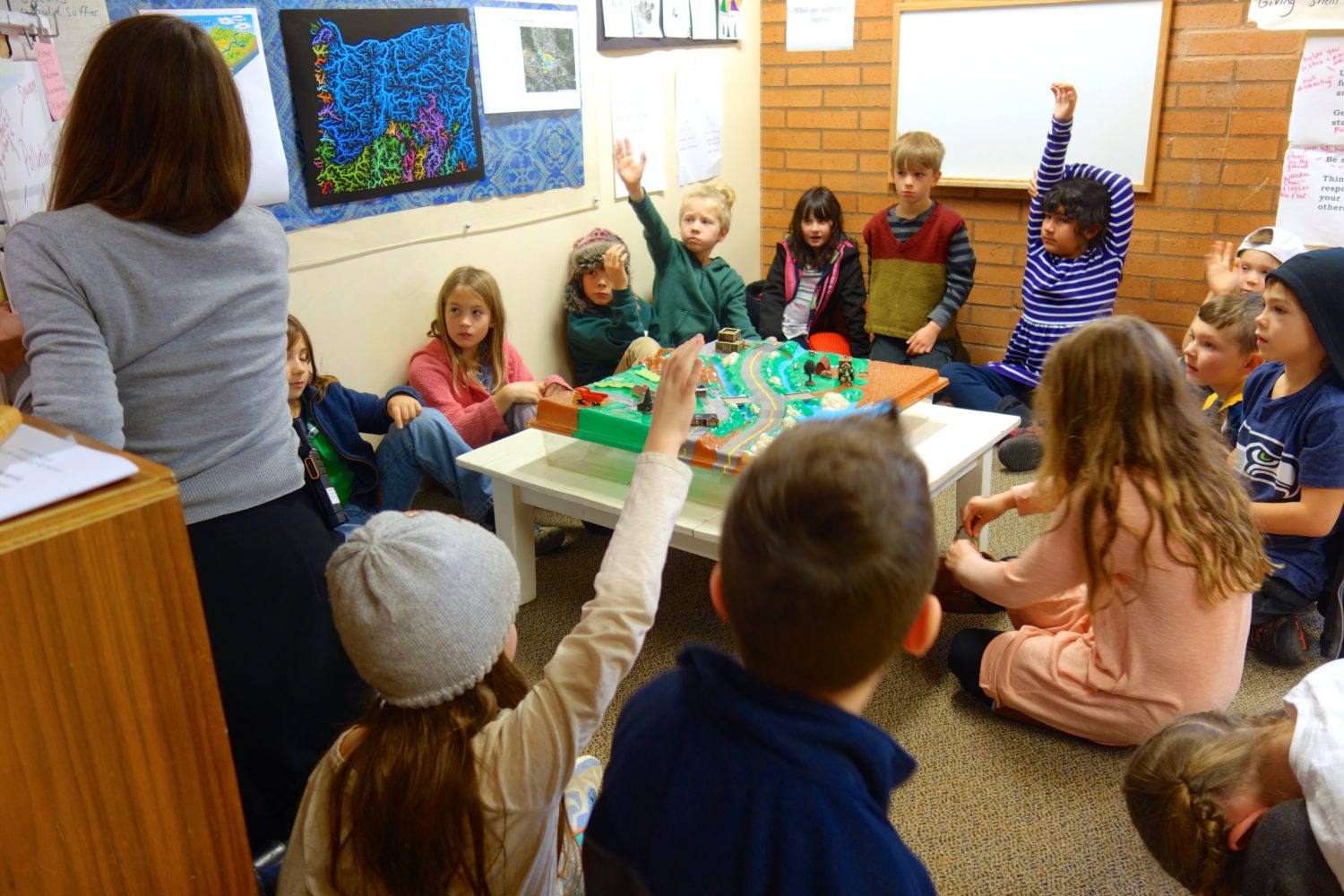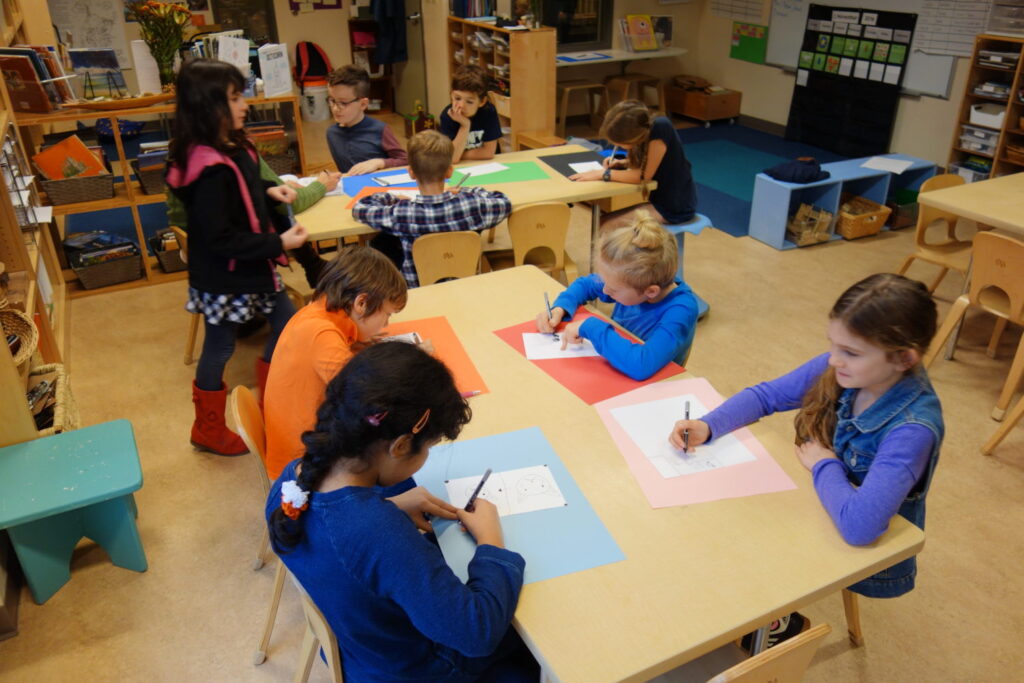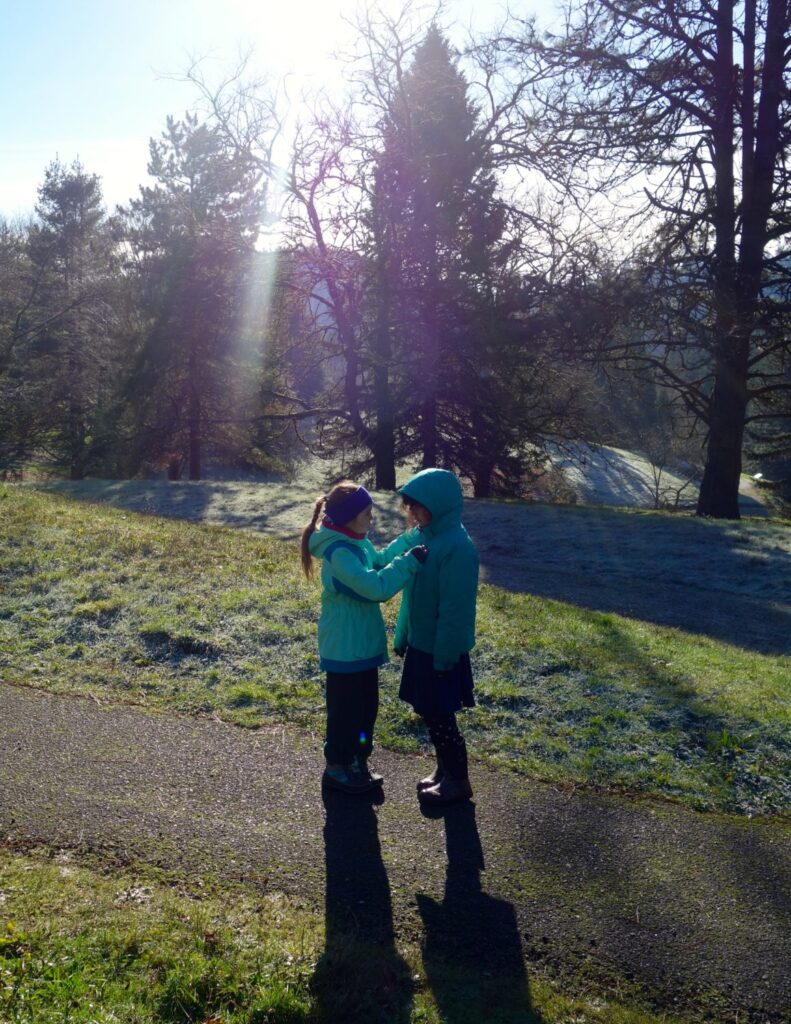Finding a Path to Productive Disagreement: Reflecting on our Response to Uncertainty and Confusion

When I think about the Opal 3 community, I find and feel evidence of tremendous growth as a community: we are more cohesive and connected than we were early in the fall; we have absorbed many rhythms and routines that help make our days run more smoothly; we know each other better so we have better ideas about how to respond when we are puzzled by how someone is acting. Individually, students have worked through conflicts, taken risks, become more proficient at reading both words and the worlds around them, and much more. We celebrate this growth and think about how to keep growing. In thinking about how to keep growing, I keep returning to a certain knot that occupies a small space in the back of my mind. I’ve noticed a pattern that happens from time to time in response to provocations and not been sure what to do about it. For a long time, I was not able to put my finger on just what was so preoccupying. When it happened again recently, I found more clarity on the issue through reflecting and talking.
A few weeks ago, I offered the students two quotations to think about in conjunction with their lives as readers and writers.
Books are more than stories;
they are doors into knowing ways to live and be in the world.
Janet Angelillo
Books without connection to knowledge of life are useless…
for what should books teach but the art of living?
Samuel Johnson
Acknowledging that they were full of complex words and ideas, I asked the students what these statements might mean to them. I was asking them to sit with something that might be confusing and see what meaning they could construct. I knew that this would be challenging and would require risk for many students. The following is an excerpt from the beginning of our conversation, following some think time and then a “turn and talk” to try out ideas with a partner:
Hannah: If you and your partner began in a place of not fully understanding these, you’re in the right place. It makes sense that we wouldn’t understand right away. We’re just starting by thinking, wondering, and considering possibilities. What did you and your partners talk about?
SR: My partner disagreed with the idea that books are more than stories.
OC: I disagree with the second one. From my view, I think the second one is saying that books can only teach you how to live. I disagree with that.
EP: We disagreed with the bottom one too. If books are the only way we can learn, what’s the purpose of going to school? Why don’t we just stay home and read books all day?
I was curious and confused by the students’ responses and how they did not seem to reflect the invitation I had offered. I had hoped to allay student concerns about not understanding or having a right answer. I had hoped we could play with interpretations and wonderings, find connections between what these writers were trying to say and our work in Opal 3, and to build understanding collectively through conversation. With students identifying what they disagreed with, one after another, clearly my hopes were not coming to light at this time – nor was our conversation going anywhere. So, I took a risk and tried think-talking, a term we coined at Opal when you talk in order to find what it is you are trying to say, much in the way that we often get to the “end” of an essay only to then figure out what we really want to write about.
Hannah: I want to think-talk. I’m not sure what I’m noticing, but I want to share. I notice a pattern of finding the parts that we disagree with in the sharing in the room. That’s so curious to me. I wonder where it comes from. Does it make you feel better? Does it make you think more deeply?
SD: Sometimes it helps me to disagree.
Hannah: Is that because it makes you feel better?
SD: I disagree so that I don’t feel threatened. Like someone’s success makes me feel threatened. And I disagree with it so I don’t feel threatened.
JK: Are these words threatening to you?
SD: Yeah, kind of. They’re hard to understand.
Hannah: I think I want to call attention to this pattern. On Monday, I was noticing our tendencies to find the part that we disagree with when we don’t understand something, as if disagreeing would help us feel more certain. I wonder if some of us are disagreeing with this quote because we’re feeling confused. So I wonder how tweaking my language might help us to play with making sense of these words. It’s important to know that there’s no right answer. What happens if I ask you instead to think about what in these words appeal to you or tickle your brains?
However, the students weren’t ready to leave the conversation and start unpacking the quotes. They continued to unpack the pattern:
GR: If someone else kind of makes a success, I feel threatened. Like in math if someone has a different answer I start thinking my math thinking is bad. That’s what my brain says – I’m not good at math. Then, it’s harder to solve a problem when I feel that way.
JK: I think it’s good to disagree. You don’t understand so you try to learn more about it.
SD: When you want to learn more about it though you ask a question. Like how did you do that? Disagreeing is that I have a totally different idea and I don’t think that is right.
GR: People have different perspectives of what disagreeing is…like in I Know the Moon. Disagreeing could be defending yourself. People have different perspectives.
MM: You could just offer your different perspective without saying you disagree.
SR: Or I could ask a question like “how did you get there?” That shows I want to learn more.
We paused in the conversation to shift back to that tangle that I now realized I had been wrestling with. I was reminded of work we had done with Melissa Pelochino, a member of the Stanford dSchool last year. She had guided us through a “No, but / Yes, and” activity which highlights the idea that nothing happens or moves forward when all we do is disagree, reject, or put down people’s ideas. I worried the students would hear my concerns as an admonishment against disagreeing, which was not at all my intention. Conversely, I want to create an environment in which students not only know how to disagree productively (in a way that is useful, that moves our collective understanding forward, that does not harm the community or its individuals), but also to know why they are disagreeing and what their intention for disagreeing is.
Hannah: What happens if most of the conversation is people contributing their disagreements?
SR: Then there’s no new ideas. You’re just saying that you disagree and leaving it at that.
Hannah: So, I want to give you a challenge. I want you to try talking and thinking about these quotations again. Can you come from a frame of being curious and asking questions in ways that would deepen your understanding about what’s in here? What happens when you approach from a frame of being curious and open?
Students turn and talk with partners.
TY: Well, my partner and I found that we agreed with the whole sentence. Like books are more than stories. Even fiction can tell you some ways that you want to live. Books can always teach things. I found connections between books being more than stories and finding places to live in the world. Every book can do that.
Hannah: How were you able to get to such a different place than before?
RP: We started with a quote and then talked through them.
TY: Yeah, and we started understanding them more as we talked through them.
EP: We were talking about shut thinking and escalation. If you are…like you get a different answer in math than someone else, both of you might start arguing. You can escalate it. By making your argument bigger and have a badder disagreement. If you ask questions and say what you did differently, you could learn more.
SM: This kind of reminds me of all that work we did with open and shut. I think if you just disagree, that is a kind of being shut.
Hannah: I think sometimes we find one little part of something that we disagree with or don’t like and use that the reject a whole thing. What happens when we do this?
RP: Fixed mindsets!
AS: It’s kind of like fixed mindset when your windows and doors are closed.
JK: You don’t let any ideas come in. So, now I disagree with what I said! That’s kind of funny! Now I have new thinking and I disagree with my old thinking.
There was a palpable shift in the classroom: it now felt much lighter, more relaxed, as if we had just overcome a tremendous obstacle. In working through the complexity of the quotations, we had worked through some of the complexity of our community. We found some meaning in the quotations. More significantly, we had a deeper understanding of our responses to uncertainty and confusion. We connected our experience to work we had done earlier in the year in a way that made both that work and this conversation more significant for us as a learning community.

Does this conversation mean that from this point on, we stopped disagreeing or putting down ideas when we felt uncertain, uncomfortable, or confused? Definitely not. However, it gave us a point of reference to reflect on when we noticed these responses happening. We could stop and think about where they were coming from, what to do about them, and how to move our thinking forward while supporting the needs and feelings of the community. Shifting these habits is slow, hard work. It doesn’t happen all at once and often feels like taking one step forward and two steps back. However, in a political and social climate in which our leaders and communities seem less and less able to disagree productively, this work feels very needed for all ages of society.
Later that week, I learned that last year when these students were in second grade, students took a big step forward in productive disagreement by learning to say, “I disagree because…” Now in third grade, we can build on that step forward to find even more steps and strategies to communicate and grow our collective and individual thinking and understanding.
What evidence do you see of students’ confusion or uncertainty? How do they respond or react to those feelings?
How do you feel and what do you do when feeling confused or uncertain?
Where can you find productive disagreement in the world around you? What can we do about unproductive disagreement?


I’ve just been lucky enough to read this post just after having read Caroline’s most recent: The Secrets of Wire. I recommend reading them together. Do you see the connections? So powerful.